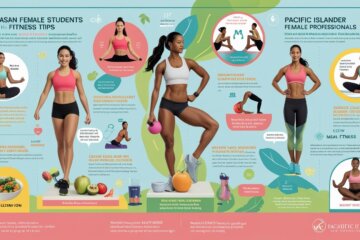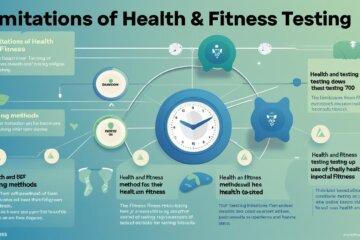Assessing health-related fitness is crucial for identifying physical strengths and weaknesses. It helps tailor personalized fitness and wellness programs.
Health-related fitness assessments provide valuable insights into an individual’s overall health. These evaluations measure components such as cardiovascular endurance, muscular strength, flexibility, and body composition. Understanding these metrics is essential for creating effective exercise regimes and health interventions. Regular assessments allow for monitoring progress and making necessary adjustments to achieve optimal health outcomes.
They also help in detecting early signs of health issues, enabling timely intervention. By focusing on personalized fitness strategies, individuals can improve their quality of life and reduce the risk of chronic diseases. Assessing health-related fitness is a proactive approach to maintaining and enhancing overall well-being.

Introduction To Health-related Fitness
Understanding health-related fitness is essential for maintaining a healthy lifestyle. It goes beyond just looking good. Health-related fitness focuses on improving your overall well-being. It includes your physical, mental, and emotional health. Assessing this type of fitness helps you understand your body’s needs.
Health-related fitness includes various components. These components work together to improve your life. Knowing these components can help you create a balanced fitness plan. This plan will focus on more than just aesthetics.
The Concept Of Fitness Beyond Aesthetics
Fitness is often linked to how one looks. Many people believe that being fit means having a toned body. But, fitness is much more than appearance. It is about how well your body functions. A fit person can perform daily tasks with ease. They have energy and endurance. Their body can fight off diseases better.
Fitness beyond aesthetics focuses on health and functionality. It means having a strong heart and lungs. It also means having flexible and strong muscles. Fitness affects mental health too. It reduces stress and improves mood. This holistic view of fitness is vital for a healthy life.
Components Of Health-related Fitness
Health-related fitness includes five main components. These components ensure overall health and well-being. Here is a brief overview:
| Component | Description |
|---|---|
| Cardiorespiratory Endurance | The ability of the heart and lungs to supply oxygen during exercise. |
| Muscular Strength | The amount of force a muscle can produce. |
| Muscular Endurance | The ability of muscles to perform repeated actions without fatigue. |
| Flexibility | The range of motion available at a joint. |
| Body Composition | The ratio of fat to lean tissue in the body. |
Each component plays a role in overall fitness. Cardiorespiratory endurance helps you stay active longer. Muscular strength allows you to lift heavy objects. Muscular endurance helps you perform tasks without getting tired. Flexibility prevents injuries and improves movement. Body composition affects your risk of diseases.
Assessing these components can help you understand your fitness level. It can guide you in creating a balanced fitness plan. This plan will address all aspects of health-related fitness. By focusing on these components, you can achieve better health and well-being.
The Importance Of Regular Fitness Assessment
Regular fitness assessment is crucial for maintaining good health. It helps you understand your current fitness level. It also guides you to improve your health. Regular checks can help you identify potential health risks early.
Benchmarking Personal Health
Benchmarking your personal health is essential. It allows you to track your progress over time. You can see how much you have improved. This motivates you to keep going.
Consider using these checkpoints:
- Weight
- Body Mass Index (BMI)
- Blood Pressure
- Heart Rate
These metrics offer a clear picture of your health. Tracking these regularly provides valuable insights. You can see trends and make informed decisions.
Identifying Risks Early
Early identification of health risks is vital. Regular fitness assessments can catch issues before they become serious. For example, high blood pressure can be a silent killer. Regular checks can detect it early.
Here are some common risks to watch for:
- High Cholesterol
- Diabetes
- Obesity
- Heart Disease
Early detection helps in taking timely action. This can involve lifestyle changes or medical intervention. Addressing risks early improves your chances of staying healthy.
| Metric | Ideal Range |
|---|---|
| Blood Pressure | 120/80 mmHg |
| BMI | 18.5 – 24.9 |
| Cholesterol | Below 200 mg/dL |
Using a table can help you understand ideal ranges. Comparing your results with these ranges is helpful. It makes it easier to identify if you are at risk.
Physical Health Benefits
Assessing health-related fitness is crucial for understanding your overall well-being. Knowing your fitness levels can help you make informed decisions about your lifestyle. This section explores the physical health benefits of assessing your fitness.
Cardiovascular Improvement
Regular fitness assessments can lead to better heart health. Cardiovascular fitness measures how well your heart and lungs work together. A strong heart can pump blood more efficiently. This reduces the risk of heart disease.
- Lower Blood Pressure: Regular exercise helps to maintain healthy blood pressure levels.
- Improved Circulation: Better cardiovascular fitness improves blood flow to all parts of the body.
- Increased Stamina: With a healthy heart, you can perform daily activities without getting tired easily.
Muscular Strength And Endurance
Assessing your muscular strength and endurance is essential. It helps you understand how strong and resilient your muscles are. Strong muscles support your bones and joints, reducing the risk of injury.
| Benefit | Description |
|---|---|
| Injury Prevention | Strong muscles protect your joints and reduce injury risk. |
| Improved Posture | Good muscle strength helps you maintain proper posture. |
| Enhanced Daily Activities | Strong muscles make everyday tasks easier and less tiring. |
Regular strength training can increase muscle mass. This helps in burning more calories even at rest. Consistent exercise can also delay the natural loss of muscle mass that comes with aging.
Mental And Emotional Wellness
Understanding the importance of assessing health-related fitness extends beyond physical benefits. It also significantly impacts mental and emotional wellness. Regular fitness assessments can play a crucial role in enhancing one’s mental state, reducing stress, and boosting cognitive functions.
Stress Reduction
Regular fitness assessments can help in reducing stress levels. Engaging in physical activities releases endorphins, which are natural mood lifters. This biological reaction can lower stress hormones and promote a sense of well-being.
Here’s how fitness assessments contribute to stress reduction:
- Identifying physical strengths and weaknesses allows for tailored exercise programs.
- Setting achievable goals fosters a sense of accomplishment and motivation.
- Regular monitoring of progress can lead to increased self-confidence and reduced anxiety.
Cognitive Function Enhancement
Fitness assessments also contribute to enhanced cognitive functions. Physical activities have been shown to improve brain health and cognitive performance.
Key benefits include:
- Improved memory and learning abilities due to increased blood flow to the brain.
- Enhanced focus and concentration from regular physical activities.
- Better problem-solving skills and mental clarity.
In summary, regular fitness assessments not only improve physical health but also play a vital role in boosting mental and emotional wellness. This holistic approach ensures a balanced and healthier lifestyle.
Impact On Disease Prevention
Assessing health-related fitness plays a crucial role in disease prevention. Understanding one’s fitness level helps in identifying potential health risks. It also aids in taking preventive measures to maintain overall well-being.
Chronic Disease Management
Regular fitness assessments can significantly aid in chronic disease management. Monitoring fitness levels helps in early detection of conditions like diabetes and hypertension. Early detection allows for timely intervention, reducing the risk of complications.
Fitness assessments provide valuable data to healthcare providers. They can create personalized fitness plans tailored to individual needs. This tailored approach ensures effective management of chronic diseases.
Immune System Boost
Maintaining a healthy fitness level can boost your immune system. Regular exercise improves circulation, promoting the efficient transport of nutrients and oxygen. This boost strengthens the body’s defense against infections.
Fitness assessments help track progress and identify areas for improvement. By focusing on these areas, you can enhance your immune response. A strong immune system is essential for preventing illnesses and promoting overall health.

Credit: slideplayer.com
Fitness Assessments In Different Age Groups
Fitness assessments help in understanding one’s physical health. They are important for all age groups. Each age group has unique needs and abilities. Tailored assessments provide the most accurate results. Below, we explore fitness assessments for children and the elderly.
Assessing Fitness In Children
Children are still growing. Fitness assessments for them must be gentle and fun. These assessments check strength, flexibility, and endurance.
- Strength: Simple exercises like push-ups and sit-ups.
- Flexibility: Tests like the sit-and-reach.
- Endurance: Activities such as running or jumping jacks.
Results help in understanding their physical development. It also helps in detecting any potential issues early.
Fitness Assessment For The Elderly
The elderly have different fitness needs. Their assessments focus on balance, strength, and mobility. These tests help in maintaining independence and preventing falls.
| Fitness Component | Test |
|---|---|
| Balance | Single-leg stand |
| Strength | Chair stand test |
| Mobility | Timed Up and Go (TUG) test |
Regular assessments help in tracking progress. They also help in adjusting exercise plans as needed.
Technological Advancements In Fitness Evaluation
Assessing health-related fitness has become easier and more accurate thanks to technological advancements. These new tools and gadgets help people track their fitness and health levels in real-time. This section explores how wearables and mobile apps are changing fitness evaluation.
Wearable Fitness Trackers
Wearable fitness trackers are devices worn on the wrist or body. They monitor various health metrics such as heart rate, steps taken, and calories burned. These devices offer real-time feedback and help users understand their fitness levels. Popular brands include Fitbit, Garmin, and Apple Watch.
Key Features of Wearable Trackers:
- Step Count
- Heart Rate Monitoring
- Sleep Tracking
- Calorie Burn Estimation
Wearable trackers provide instant feedback, making it easier to adjust workouts. They also help in setting and achieving fitness goals. Data collected can be shared with health professionals for better assessment.
Mobile Health Applications
Mobile health applications, or mHealth apps, are software programs designed to run on smartphones and tablets. These apps offer features like workout plans, nutrition tracking, and virtual coaching. They provide a convenient way to monitor and improve health and fitness.
Popular Mobile Health Apps:
- MyFitnessPal
- Strava
- Headspace
- 7 Minute Workout
These apps often include interactive features that engage users. Many apps allow users to connect with friends for motivation and support. Some apps even integrate with wearable trackers for a comprehensive fitness assessment.
Technological advancements in fitness evaluation are significant. They provide accurate, real-time data and make it easy to track and improve health and fitness.

Incorporating Fitness Assessment Into Lifestyle
Assessing your health-related fitness is crucial for overall well-being. By incorporating fitness assessments into your lifestyle, you can create a personalized fitness plan and gain community and social support. These elements are key in achieving your health goals and maintaining a healthy lifestyle.
Creating A Personalized Fitness Plan
A personalized fitness plan tailors exercises to your specific needs. It considers your current fitness level, goals, and any medical conditions. This plan helps you stay motivated and achieve your fitness goals effectively.
Fitness assessments provide vital data about your body composition, strength, endurance, and flexibility. With this information, you can set realistic goals and track your progress. This makes your fitness journey more rewarding and manageable.
Here is a simple table to understand the benefits of a personalized fitness plan:
| Benefit | Description |
|---|---|
| Specific Goals | Set achievable and personalized targets |
| Motivation | Stay focused and driven |
| Track Progress | Monitor improvements over time |
| Safety | Reduce the risk of injury |
Community And Social Support
Building a support network is essential in a fitness journey. Community and social support can significantly impact your commitment to staying active.
Joining a local fitness group or gym can provide a sense of belonging. You meet people with similar goals, which can inspire and encourage you.
Online communities also offer valuable support. Forums, social media groups, and fitness apps connect you with people worldwide. They share tips, success stories, and motivation, making your fitness journey enjoyable.
- Share your progress and get feedback
- Find workout buddies
- Access expert advice
Support from family and friends can also boost your morale. Discuss your goals with them and seek their encouragement. Their support can be a powerful motivator.
Frequently Asked Questions
What Is The Significance Of Assessing Health Fitness?
Assessing health fitness identifies potential health risks, tracks progress, and helps create personalized workout plans. It enhances overall well-being and longevity.
What Is The Significance Of Fitness Assessment?
A fitness assessment identifies your current health status and fitness level. It helps set realistic goals and track progress. This evaluation customizes your workout plan, ensuring safe and effective training.
What Is The Importance Of Health-related Fitness?
Health-related fitness boosts physical and mental well-being. It reduces the risk of chronic diseases. It enhances daily functioning and energy levels. It improves mood and mental health. It promotes a longer, healthier life. Prioritizing fitness leads to a better quality of life.
Why Is It Important To Evaluate Health And Fitness Information?
Evaluating health and fitness information ensures accuracy and safety. Misinformation can lead to harmful practices. Trust reliable sources.
Conclusion
Assessing health-related fitness is vital for maintaining overall well-being. It helps identify strengths and weaknesses in physical health. Regular assessments guide personalized fitness plans, enhancing performance and reducing injury risks. Prioritize health-related fitness to achieve a balanced and healthy lifestyle.
Stay proactive with assessments for long-term health benefits.

“As the voice behind Radiant Glow Health, we are dedicated to being your ultimate wellness and vitality companion. Our mission is to inspire and guide you on your journey to a healthier and more vibrant life. Join us as we explore holistic health practices and empower you to radiate wellness from within.”



